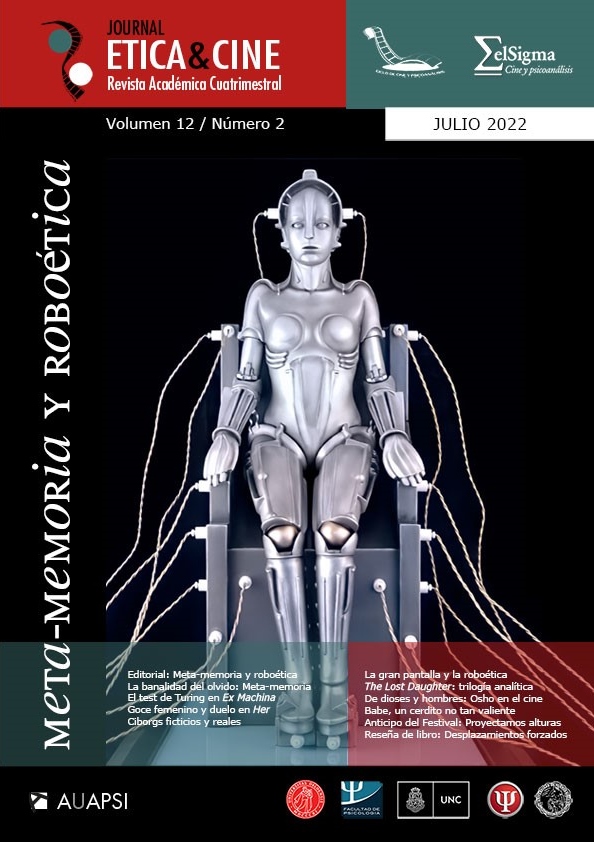“You woke me up”: the encounter with feminine jouissance as a condition of mourning in Her, by Spike Jonze
DOI:
https://doi.org/10.31056/2250.5415.v12.n2.38326Keywords:
Mourning, Feminine jouissance, Bournout society, Ideal observer, Reception theory, PsychoanalysisAbstract
From contemporary psychoanalysis, the philosophical proposal of Byung Chul Han and reception theory, this article seeks to identify Her, by Spike Jonze, as the contemporary representation of female enjoyment or jouissance. As I argue, this notion organizes two processes of subjectivation carried out by the protagonists in succession: first, the configuration of Samantha, initially, as an object-a, cause of desire, and, later, as a symbol of female enjoyment; and second, the intersubjective recomposition of Theodore as a mourning agent. To this end, in the first section, I support a detailed reading of the society represented in Her as a hyperbolic simile of what Han has called burnout society, while I identify Theodore as a double symbolization of the paradigmatic tired and melancholy Prometheus. In the second section, divided into two, I address the conditions of the first referred subjectivation process in order to propose that Theodore and Samantha’s relationship configure a metaphor of psychoanalytic transference; and that Samantha, as a subjectivity in evolution, must, first, gain a sexualized corporality to, finally, wager on the eradication of finite materiality. Finally, in the third section, I delve into the second process of subjectivation alluded to in order to support how Theodore’s exposure to female jouissance enables his mourning. I conclude, then, that Her not only represents the burnout society, but also a commitment to its eradication based on a return to affections and human intersubjectivity.
Downloads
References
Agamben, G. (2005). Profanaciones. Adriana Hidalgo. https://b-ok.lat/book/1094142/526dcb
Bauab, A. (2000). El duelo: entre el dolor y el desafío. Escuela Freudiana de Buenos Aires. www.efbaires.com.ar/files/texts/TextoOnline_72.pdf
Badiou, A. (2012). Elogio del amor. La esfera de los Libros. https://b-ok.lat/book/5360165/37db45
Jonze, S. (Director). (2013a). Her [película]. Annapurna Pictures, Stage 6 Films.
Jonze, S. (Director). (2013b). Her [guion]. Annapurna Pictures, Stage 6 Films. https://www.scriptslug.com/script/her-2013
Han, B. Ch. (2014a). La agonía del Eros. Herder.
Han, B.Ch. (2014b). Psicopolítica. Herder. https://b-ok.lat/book/5152296/20c6fa
Han, B. Ch. (2017). La sociedad del cansancio. Herder. https://b-ok.lat/book/5255875/7618c3
Evans, D. (1997). Diccionario Introductorio de Psicoanálisis Lacaniano. Paidós.
Freud, S. (1997). Duelo y melancolía. En Obras Completas. Tomo XIV (p.241-255). J. Strachey, A. Freud, A. Strachey y A. Tyson (Eds.). J. Etcheverry (Trad.). Amorrortu Editores.
Fuentes, A. (2016). El misterio del cuerpo hablante. Gedisa.
Lacan, J. (1998). El seminario de Jaques Lacan. Libro 20, Aun. Paidós.
Murphy, P. (2018). ’You feel real to me, Samantha’: the matter of technology in Spike Jonze’s Her. Technoculture: An Online Journal of Technology in Society, 7. http://doras.dcu.ie/23086/
Queipo, R. (2013). Topologías de la transferencia [Presentación de la ponencia]. V Congreso Internacional de Investigación y Práctica Profesional en Psicología XX Jornadas de Investigación Noveno Encuentro de Investigadores en Psicología del MERCOSUR, Buenos Aires, Argentina. https://www.aacademica.org/000-054/804.pdf
Watts, A. (1995). Budismo. Kairós. https://laicos.antropo.es/religiones/buda/Watts.Alan_Budismo.La-religion-de-la-no-religion.pdf
Žižek, S. (2014). Acontecimiento. Sexto Piso.
Downloads
Published
How to Cite
Issue
Section
License
Copyright (c) 2022 Ética y Cine Journal

This work is licensed under a Creative Commons Attribution-ShareAlike 4.0 International License.
Los autores que publiquen en Ética y Cine Journal aceptan las siguientes condiciones:
Los autores/as conservan los derechos de autor © y permiten la publicación a Ética y Cine Journal, bajo licencia CC BY-SA / Reconocimiento - Reconocimiento-CompartirIgual 4.0 Internacional. La adopción de esta licencia permite copiar, redistribuir, comunicar públicamente la obra, reconociendo los créditos de la misma, y construir sobre el material publicado, debiendo otorgar el crédito apropiado a través de un enlace a la licencia e indicando si se realizaron cambios.

Este obra está bajo una licencia de Creative Commons Reconocimiento-CompartirIgual 4.0 Internacional.




